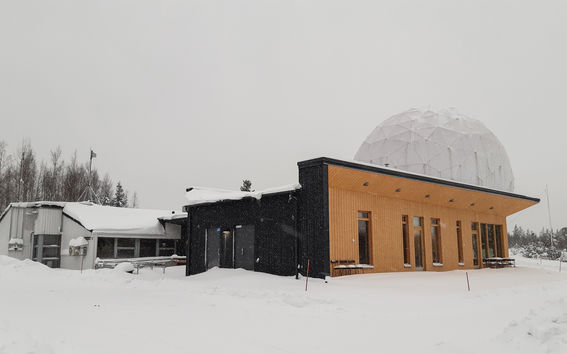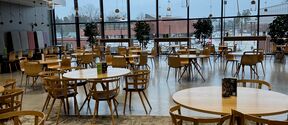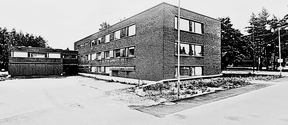Metsähovi Radio Observatory renovation is complete

The extensive renovation of Aalto University's Metsähovi Radio Observatory, which took more than a year, is now complete. The oldest part of the observatory, built in the 1970s, was dismantled. An extension part, which was built in the 1990s, was renovated, and a completely new wing was built in connection with it. The new facilities include a room for meetings and seminars, workspaces, a kitchen, social facilities, and laboratory facilities.
In the renovation, building service technology was upgraded, and energy efficiency was significantly improved: for example, oil heating was replaced by environmentally friendly geothermal heating, more energy efficient windows were installed, ventilation was upgraded, and heat recovery was introduced.
‘We are eagerly waiting to continue our research work and teaching, and to receive guests in our upgraded facilities’, says Metsähovi Director Joni Tammi.
The Metsähovi Radio Observatory monitors, for example, radiation emanating from the sun and from black holes on every day of the year, and the renovation period was no exception.
‘Our technical team succeeded in ensuring that the equipment and observations also worked during the renovation, even though this required special arrangements of many kinds’, says laboratory engineer Juha Kallunki. For example, radio silence, which is in force over the entire area, was challenging for the contractors, because radio transmitters can be found in almost all types of construction machines nowadays.
Major investment into national astronomical research
Aalto University has invested heavily in the upgrading of Finland's only astronomical radio observatory and its research equipment in recent years. In a major operation last summer, the radar dome of Metsähovi's main research instrument, a 14-metre radio telescope, was replaced.
‘This is an indication that Aalto University also wants to invest in basic scientific research. The upgrades ensure that our activities and radio astronomy research in Finland can continue far into the future’, Joni Tammi says.
- Updated:
- Published: This content was originally published on www.aalto.fi.
Read more news

Join us for Demo Day 2026 - March 4 at A Grid
On March 4th, A Grid is the place to be because Aalto Startup Center x A Grid Demo Day will be taking place.
A Bloc becomes a “living lab” for Aalto students: Entrepreneurial Futures course and Cafetoria join forces in pop-up collaboration
A Bloc’s pop-up space turned into a hands-on learning environment when Entrepreneurial Futures course and Cafetoria co-created a pop-up.
Learning Lounge offers more study space on campus
Student, having a hard time finding a space?